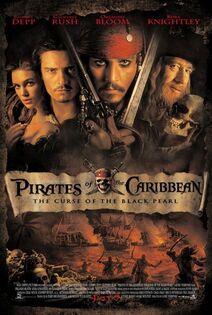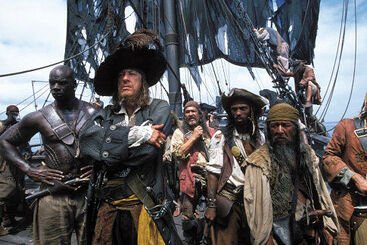
“To blazes with the code!”
In April, Disney Plus reportedly (and unsurprisingly) surpassed 50 million
subscribers worldwide. My family and I are just one of them, and we recently
found that amongst its extensive catalogue featuring interplanetary warfare
and more superheroes than you can shake a stick at, there are plenty of
old, household favourites to rediscover. One such classic we recently revisited,
was Pirates of The Caribbean: The Curse of The Black Pearl – a mouthful in name,
but also a gut-buster in running time. No matter for the Gentry clan! For
some reason, we were all eager to welcome the sounds of a drunken,
jumpy, cowardly chicken that is Captain Jack Sparrow (Johnny Depp), back into
our living room. It was as if we were being reunited with an old friend – albeit
one who raids the drinks cabinet, or tells a tall tale or two.
As we hit play and were transported back to the roaring high seas, everything was, comfortingly, as we remembered it. Epic Hanz Zimmer score? Check. Bombastic action sequences? Check. Ropey Orlando Bloom performance? Check. Let the swashbuckling commence, I thought. And yet, despite mine and my brother’s ability to regularly quote the script because of our low-level obsession with the Pirates series (honest!), I found myself intrigued by a previously undetected layer to it all: the mention and enforcing of simple constitutions, or subtle hints of supposed morality within the lives of these rag-tag crews.
I first noticed this when, in a moment of desperation, damsel in distress Elizabeth Swann (Keira Knightley) invokes “the code”, something all pirates must apparently honour. She “demands parlay”, much to the displeasure of some eager-to-pillage pirates and is taken to see the fearsome, Captain Barbossa (Geoffrey Rush). Whilst we know scallywags aren’t to be trusted, Elizabeth’s naiveté leads her to believe that she’ll receive fair treatment, and it’s here that we soon find these pirates to be seemingly nothing more than treacherous, self-centred individuals (and not to mention undead), when their captain cruelly reveals the code to be “more (of) what you’d call guidelines than actual rules”.
Ironically, these pirates continually pride themselves on following a ‘code of conduct’, when in fact they choose to break from it whenever the opportunity allows. The Bible actually teaches that we are in fact much like these scoundrels of the high seas. In trying to live even by our own set of codes that we have written for ourselves, we fail continuously, choosing to pursue self-preservation, greed or a number of other sinful things instead. Just as within Pirates, our code that we have written for ourselves is completely flawed - we need only watch the news to realise this.
But in reading the Old Testament, we find that God spoke through his prophet Isaiah, to deliver this important message to the Israelite people, who were trying to live life according to their own rules:
“For my thoughts are not your thoughts,
neither are your ways my ways,” declares the Lord.
“As the heavens are higher than the earth,
so are my ways higher than your ways
and my thoughts than your thoughts.
(Isaiah 55:8-9, NIV)
Thankfully, unlike the Pirates code, the Lord’s does not betray His own ways or lead from a place of hypocrisy. Rather, His commandments and His ways are perfect and will always be trustworthy. For whilst we see Captain Jack and his crew desert people without taking a moment to consider the value of human life, God never wants us to be left behind. So much so that He sent His Son Jesus on a rescue mission to lay down His life for us. Jesus rose again, not in a weird ‘undead’ way, but by conquering death and its power over us. In fact, God “does not want anyone to be destroyed, but wants everyone to repent” (2 Peter 3:9, NLT), which means to turn from living by their own codes which only bring death in eternity, and towards His ways which bring life in all its fulness today and forever.
Dear Lord,
As I watch this film, I ask that you would be present here with me. Highlight to me anything within it that is honourable, anything that can be used in conversation for your Kingdom purposes. Amen.
Pirates of The Caribbean: The Curse of The Black Pearl is now available to stream on Disney Plus



 RSS Feed
RSS Feed